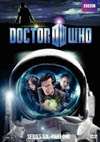DVD Extras (box sets only) include:
Mystery fuels this story's narrative, beginning with Amy and the villains trying to figure out exactly what the Doctor and Rory are up to. We know the general flavour, but we want the details, not least of which because it might reveal the quality of the philosophy behind the actions, which begins to come into doubt. Now theoretically, this section could be portrayed more straightforwardly, with the audience getting the Doctor and Rory's perspective on events as they travel from location to location in the TARDIS... but would that really have been more interesting? It might easily become way too slow. I like what Moffat has done here - it keeps the story exciting and moving at a nice clip. Even though the actual reveal of the Doctor takes quite a while, he is very busy, and we are learning interesting new things about his actions the whole time. Excellent. I have to wonder how many of these characters and situations might have been established in the spin-off shows, or in novels or new CD audio stories, or wherever. Some of it is a bit too fast to truly figure out from here alone, but I like the generally rich density of it anyway, and the feeling that there is more there that has not been revealed in this one episode.
The Cybermen are actually seen to have some power and level of influence in the galaxy as well - something glossed over all too easily in their other stories. They monitor all communications in an entire sector, eh? Hmmm. That's new. And about time. I like it. Dorium Maldovar is a great character, and I love Simon Fisher-Becker's performance in the role. This is the story that utilizes him best I think. Frances Barber's character of Madame Kovarian is also at her strongest and most definitive here as well, and makes a truly unique and mysterious adversary. She is so far and above most of the female villains Russell T. Davies repeatedly came up with in his stories. Nice. We get more religious military people here - and this does seem weird, yet another bit of colour Moffat throws in without completely explaining it. Perhaps we'll get a more rational exploration one day to help us simple 21st century folk wrap our heads around the cultural idea. The Thin One and the Fat One really do need names, otherwise they're getting far too comfortable in a rut playing opposition to perceived prejudice.... As army personnel, this could be the thematic point to their existence here as characters, but we don't really see enough of them to be clear about this and do something with it. Better just to give them proper names. I'm not crazy about the headless monks (or headless anything, for that matter). The elements surrounding them that do work all seemed pinched from the Sith (and/or Jedi) from the Star Wars universe, with the glowing swords as weapons of choice being too much of a giveaway. The headless part that makes them unique is actually kind of silly, and takes us away from credibility and into fairy tale magic. And if they are headless, why make a secret out of it? They've really got nothing to hide, literally. I think it's important here too to acknowledge that all these various races get their own little moments, and make their own unique contributions to the main plot, which is a huge improvement over "The Pandorica Opens" (story no. 217), where they all struggled to play the same singular small bit part at the same time. Also, you can keep characters like Vastra and Strax on screen and give them a wide variety of emotional moments to play, and it remains dramatic and interesting. Meanwhile, Daleks for once are not included today. Ahhh, refreshing!
Demons Run When a Good Man Goes to WarAs questions surrounding the means of the Doctor's rise to glory give way to discovering the motivations for the villains, and what might trigger the anticipated drop of the Doctor to the depths of despair, the episode maintains a good bit of intrigue and sense of mystery throughout. It's the way things should be. Moffat often attempts intricate mystery, but I think he pulls it off better here than in any of his other Matt Smith stories. And unlike in "The Impossible Astronaut" (story no. 219), the sense of anticipation for where this one is headed is nicely laid in and quite strong.I also like the way the Doctor's character and ultimate lasting influence is brought into question here, which probably hasn't quite been done this well since "The Trial of a Time Lord" (story nos. 144-147), and is definitely more action-oriented and focused here. Moffat began hinting at this previously, particularly in "The Pandorica Opens", and it becomes critical later on, but I think it is at its best here. Matt Smith has a lot of nice moments in this one where he gets to play the dual sides of philosophy motivating his character, and there is a true sense that he may end up falling on either side, even while he maintains the best of intentions. Very well done. Beware though the difference between the territory, and any given character's map of perceiving it. Madame Vastra has a misleading line at one point, when she declares that the Doctor has risen higher than ever before, taking the entire base with "not a drop of blood spilled". Lots. Monks and soldiers started firing at each other, a critical part of how the whole thing went the Doctor's way. Plus, a good part of an entire cyber fleet got wiped out at the Doctor's hand. This wasn't quite as bloodless as Vastra thinks... although it's still a nice moment, and characters should have room to be misinformed like this. We the audience just need to remember to stay vigilant enough to see through it. This story also gets a point for something that is NOT in it - namely it does not really try to mess with time or introduce any conundrums. Nothing here, either actual or speculated, is spawned from bad time theory, which is fairly unique for a Steven Moffat story. I like it. The big revelation for the end somehow seemed to be the obvious one by the time I got to this episode on first viewing, although I can't quite remember why, and it was a bit underwhelming I think. BUT, there are plenty of other surprises here as well - all good. I found it thoroughly confusing though about why the Doctor sends Amy and Rory home with River Song instead of taking them in his TARDIS. It makes much better sense in retrospect, on repeat viewing after having seen the rest of the season, and the prequel scene to the next story perhaps crystallizes the attitude behind the character motivation best of all.
International Titles:Deutsch: "Demons Run"Magyar: "Egy jó ember..."Français: "La Retraite du démon"Русский: "Хороший человек идёт..."Most languages here seems to be improving on the title in one way or another. German and French both derive their title from the more appropriate "Demons Run" name, with the Germans nailing this title exactly as I'd have wanted it. Meanwhile the Hungarian "ember" and the Russian "человек" are more gender-neutral words than the English "man" - much more appropriate for a generalization found in an old legend.
This story has become available on DVD and Blu-ray. Click on the Amazon symbol for the location nearest you for pricing and availability:
Note: The full season sets contain commentaries, behind-the-scenes featurettes, and other extras. The smaller volumes feature little more than the plain episodes. Comments on this article are welcome. You may contact the author from this page:
|
||||||||||||||||||||||||||||||||||||||||||||













